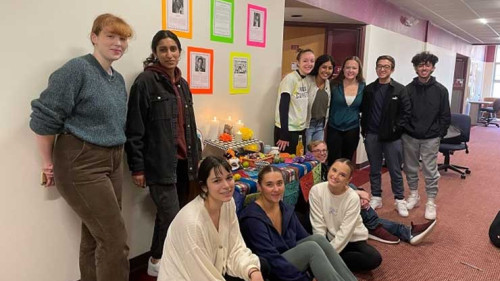
The vintage black and white photo shows a militia woman attired in a mono, a common garment of the Spanish working class. She is reading a fashion magazine, her rifle nestled next to her. What does this scene tell us – about the woman, the country, and its politics?
“Fashioning Women in Spain,” a new seminar being taught by Marcela Garcés, Ph.D., associate professor of Spanish, explores these questions and more. The textbook is a 2021 volume Garcés co-edited: Fashioning Spain: From Mantillas to Rosalía. It grew out of a conversation she had with co-editor Francisco Fernández de Alba at a 2017 academic conference in Spain.
“Fashion can be interpreted as ‘material culture’ and can relate to an individual or an individual within a society,” said Garcés. “You can take any historical moment – not just in Spain – and understand it through the lens of fashion.”
She said clothes, accessories and jewelry, whether formal or informal, are connected with politics and culture, and are not just about fashion for fashion’s sake.
The editors gathered eight chapters under three headings: Identity: Politics and Futures; Picturing Femininity: Film and Photography; and Designing Fashion Stars: Film and Music. The book’s cover shows a model in a pastiche of a sailor dress and hat, which are actually crafted from purloined tablecloths and napkins – a melding of counterculture low couture with high couture symbolizing Spain’s 1980s transition to democracy. (Their current constitution was adopted in 1978.)
Fashioning Spain is a cultural history of Spanish fashion in the 20th and 21st centuries, a period of significant social, political, and economic upheaval. Garcés explained that as Spain moved from dictatorship to democracy and, most recently, to the digital age, fashion has experienced seismic shifts in relation to those changes.
Students in her class are researching fashion through photographs, films, music videos, social media posts and museum exhibits.
To celebrate the food and fashion of Spain, several classes came together October 27 for a Fashioning Spain book presentation event organized by Laurie Naranch, Ph.D., professor of political science and coordinator of the women’s, gender and sexuality studies program.
“We are inviting our students and colleagues to take fashion more seriously, to work more with it academically. While fashion has at times been seen as objectifying women, or has been devalued because it is associated more with women, we are asking people to step away from that assumption and see the centrality of fashion in shaping culture.”
Marcela Garcés, Ph.D., associate professor of Spanish
“I am very grateful that Dr. Garcés shared her book with our class. For such a long time the historical context and political influence of fashion has been ignored around the world. This book dives deep into these themes in Spain and finally gives fashion the recognition that it deserves.”
Samantha Welsher '22
“This topic is unique and has never been introduced to me previously. Before reading this book in her class, I had no idea that a culture’s style could be so heavily influenced by politics, current events, and societal norms.”
Hailey Cowles '22

